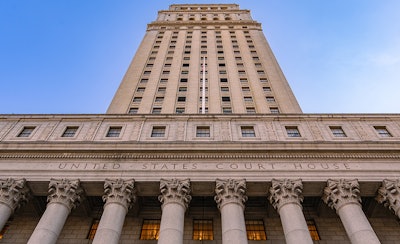
New York’s argument that the U.S. Constitution does not apply to its state cannabis licensing program is flawed, a federal court ruled Aug. 12.
The U.S. Court of Appeals for the Second Circuit ruled that the New York Cannabis Control Board’s (CCB) licensing procedure for adult-use dispensaries violated the dormant Commerce Clause by providing in-state applicants with cannabis-related offenses an advantage.
Under the dormant Commerce Clause of the U.S. Constitution, states are forbidden from adopting protectionist measures in order to preserve a national market for goods and services.
However, many state cannabis programs have evaded constitutional attack while prioritizing in-state applicants for licensure because interstate commerce is outlawed under cannabis’s Schedule I federal status—meaning there is no national cannabis marketplace to protect from state economic isolationism.
In New York, state officials argue that the CCB’s residency requirement for preferred licensure does not violate the dormant Commerce Clause because the board’s purpose following adult-use legalization was to award licenses to business owners previously impacted by drug war policies as a restorative justice measure, not an economic protectionism measure.
Furthermore, the state argued that because cannabis is federally illegal, a pair of license applicants with ownership ties to California has no standing to challenge state law.
The plaintiffs/appellants in the case, Variscite NY Four LLC and Variscite NY Five LLC, submitted adult-use dispensary license applications for the CCB’s December 2023 licensing pool. While Variscite’s majority owners had lived in “communities disproportionately impacted by cannabis prohibition” in Los Angeles, they did not have cannabis convictions in New York and therefore failed to satisfy New York’s “extra priority” requirements for licensure.
Variscite filed a motion in December 2023 for a temporary restraining order and a preliminary injunction, but the U.S. District Court for the Northern District of New York denied preliminary relief to Variscite in February 2024, ruling that the dormant Commerce Clause does not apply to markets that Congress has criminalized.
Variscite appealed, and, on Aug. 12, the Second Circuit vacated the district court’s decision in a 2-1 ruling.
“That was [an] error,” Circuit Judge Dennis Jacobs wrote in Tuesday’s majority opinion about the district court’s ruling.
“We hold that Plaintiffs-Appellants have standing to challenge certain of New York’s licensing practices under the dormant Commerce Clause, and that their suit is ripe; that the dormant Commerce Clause applies and Congress has given New York no clear permission to enforce protectionist marijuana licensing laws; and that New York’s prioritization of applicants with convictions under New York law is a protectionist measure that cannot stand,” Jacobs wrote.
In other words, the Second Circuit’s opinion is that New York’s conditional adult-use retail dispensary (CAURD) licenses, issued beginning in 2022, to businesses owned by justice-involved individuals are unconstitutional.
Specifically, New York’s cannabis regulators issued 291 CAURD licenses.
Jeffrey Jensen, a California and New York lawyer who founded the Variscite companies that have sued New York’s cannabis regulators multiple times, was not surprised by the Second Circuit ruling in Variscite’s favor.
“The Second Circuit reached the conclusion mandated by the Constitution,” Jensen told Cannabis Business Times. “The dormant Commerce Clause applies to all cannabis licenses because the federal government’s power to make cannabis illegal under the Commerce Clause is wholly separate from a state’s inability to prefer its own residents for economic advantages under the dormant Commerce Clause.”
The Second Circuit’s ruling falls in line with a First Circuit Court ruling from August 2022, which upheld a lower judge’s ruling in Maine that the state’s residency requirement for medical cannabis business owners was unconstitutional.
Matthew S. Warner, a partner at law firm Preti Flaherty Beliveau & Pachios LLP who represented the plaintiffs in Maine, told CBT at the time that the First Circuit’s ruling “confirms that the U.S. Constitution applies to the marijuana industry like it does to any other. … To have constitutional protections in place that every other industry has will be good for the industry in the long run, and it should certainly influence the way policymakers start doing their jobs, now.”
In addition to the First and Second Circuit rulings that are now finalized, there are three active appeals—one in the Fourth Circuit and two in the Ninth Circuit—that also relate to the dormant Commerce Clause’s application to state cannabis license preferences.
Notably, Jensen is a lawyer tied to the appeals in both the Fourth and Ninth circuits, but for different clients.
Should there be an eventual circuit split, the losing parties could seek relief before the U.S. Supreme Court.
RELATED: Revisiting Gonzalez in the Face of a Potential Circuit Split
In Tuesday’s Second Circuit ruling, Jacobs wrote that “a prohibition intended to eradicate an interstate market is not a license for states to incubate intrastate markets in the same product.”
The judge explained that while bans on interstate commerce can lead to complementary state bans, New York has not banned interstate cannabis traffic but rather provided licensing preferences to individuals who obtained cannabis convictions in New York, whether they left the state thereafter or not.
“To privilege state protectionist legislation, Congress must do more than disapprove of an interstate market: It must approve the protectionism itself,” Jacobs wrote.
“The only thing Congress has clearly authorized by criminalizing marijuana is federal prosecution for the manufacture, distribution and possession of marijuana,” the judge wrote. “Congress has given New York no clear permission to favor its residents over others whose businesses skirt the federal drug laws.”



























